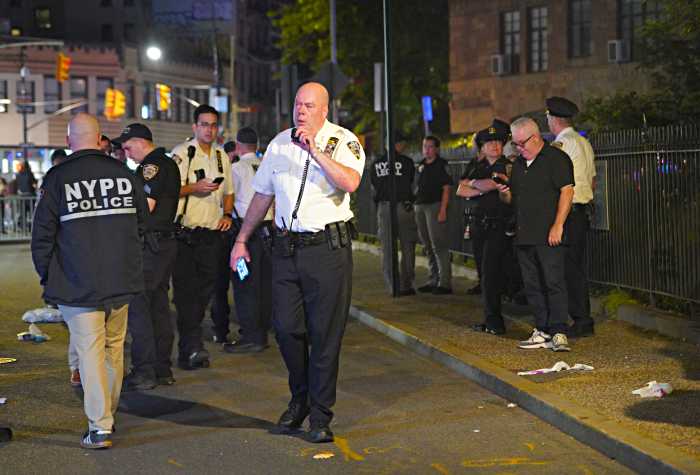Judge bars enforcement of Solomon Amendment against Yale Law School
U.S. District Judge Janet C. Hall issued an injunction on January 31, barring the government from enforcing the Solomon Amendment against Yale University in New Haven, Connecticut.
Responding rapidly to this development, Yale Law School’s dean, Harold Koh, announced that the school would reverse the decision taken a few years ago to suspend its anti-discrimination policy in the case of the military. The practical effect will be that military recruiters will be excluded from activities administered by the school’s career services office, and will not be afforded official on-campus access for interviewing. In fact, however, almost all job interviewing of Yale students is conducted off-campus.
Hall’s decision, ruling on pre-trial motions in a lawsuit brought by a majority of the Yale Law School faculty against Defense Sec. Donald Rumsfeld, in his official capacity, is the second major strike against the Solomon Amendment, following a ruling on November 29 by the Third Circuit Court of Appeals, which reversed a federal trial court in New Jersey. In both cases, the courts found that the Solomon Amendment imposes unconstitutional conditions on the receipt of federal funding by pressuring law schools to allow military recruiters equal access to their campuses despite institutional commitments against anti-gay discrimination.
The justice department obtained a stay of the Third Circuit ruling, which would have barred enforcement of the Solomon Amendment at numerous law schools around the country that joined an umbrella organization called FAIR in order to bring the lawsuit, pending an application to the Supreme Court for review, which will be filed this month. It is likely that the justice department will seek a similar stay of Hall’s decision while appealing it to the Second Circuit Court of Appeals, based in Manhattan.
The Solomon Amendment, first adopted in 1994, authorizes the defense department to maintain a list of institutions of higher education that deny military recruiters equal access with other employers to their on-campus placement and recruitment activities. Those institutions are disqualified from receiving any federal financial assistance under the defense department appropriations and several other federal executive branch departments, including the education department. Student financial assistance, however, is not affected.
The defense department began to “crack down” against schools that barred military recruiters after 9/11, changing its interpretation of the amendment so that entire universities could be disqualified if any of their units, such as a law school, had such a ban. The defense department argues that on-campus recruiting at law schools is vital to its mission to hire sufficient lawyers to staff the judge advocate general divisions of each of the uniformed services.
The defense department has argued, in papers recently filed with the Third Circuit, that the need for military lawyers has expanded as a result of U.S. military operations overseas since 9/11, making its need to recruit on-campus more compelling. It has yet to present proof, however, that it is unable to meet its recruitment needs through alternative arrangements, or that it was hobbled in recruitment during the many years that most law schools excluded military recruiters.
Yale was among the first law schools, back in the late 1970s, to ban military recruiters due to the armed services’ anti-gay policies. In 1990, the Association of American Law Schools, to which almost all accredited U.S. law schools belong, amended its membership policies to require that all schools have non-discrimination policies that include sexual orientation, and that such policies apply to placement office access.
When the department began its post-9/11 crackdown, virtually all of the nation’s major research universities required their law schools to allow the military to resume on-campus recruiting. But several dozen schools banded together in FAIR to contest the policy in the courts. Although Yale did not join FAIR, most of its faculty decided to bring their own lawsuit. A group of Yale students has filed a separate lawsuit, asserting their own constitutional claims.
Hall essentially adopted the same legal analysis that the Third Circuit Court of Appeals had endorsed in November, finding that the Solomon Amendment improperly requires law schools to subvert their own non-discrimination policies, and the messages they send to their students, when it forces the military back onto campus. The academic freedom of educational institutions to make policy decisions is thus compromised. Federal courts have recognized that the First Amendment protects such academic freedom, and the recent cases have found that right violated, both in terms of "compelled speech" and "forced association."
The government must show in response that abridging such fundamental rights is necessary to achieve a compelling interest, and is narrowly tailored to do the least damage possible to that right. Hall found that the military has a compelling interest to recruit sufficient high quality lawyers, but that the Solomon Amendment has not been shown to be necessary to that interest.
The Third Circuit found last year that the defense department has failed to show that on-campus recruitment is essential to achieve its hiring goals. Indeed, the Third Circuit judges found that the Solomon Amendment has, if anything, created ill will against the military at law schools, by highlighting the controversy over its anti-gay personnel policies. At most schools, military recruitment is accompanied by official statements from the school condemning the military policy, and at many schools recruiters are confronted by pickets and public forums at which speakers deplore the policy.
gaycitynews.com


































